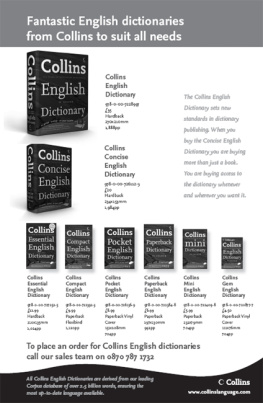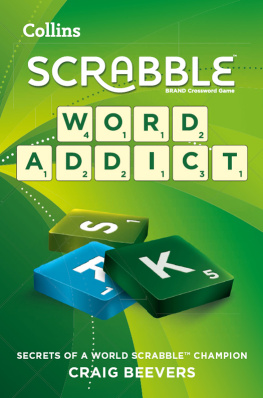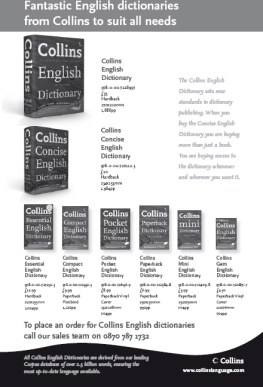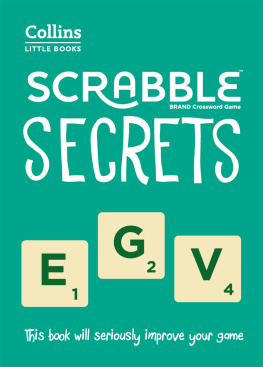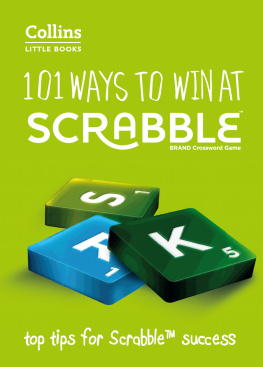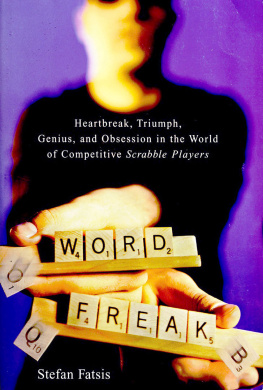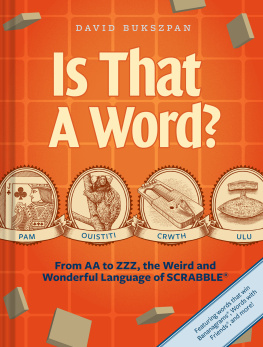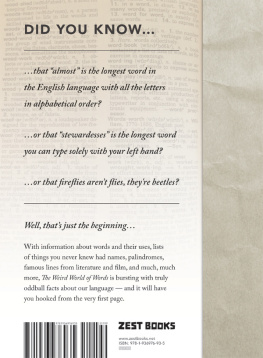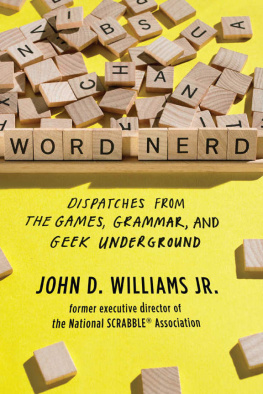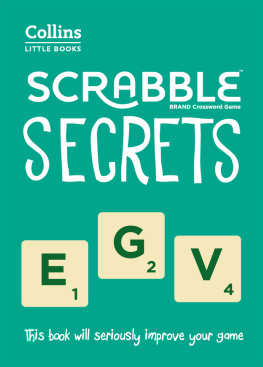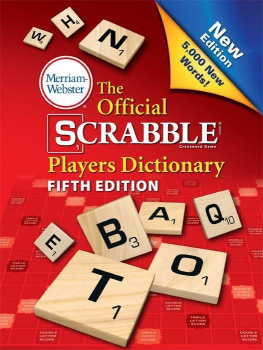T HIS BOOK STARTED, quite literally, with a challenge. A few years back, a friend invited me to join her one warm spring day in Brooklyns lovely Prospect Park for a game of Scrabble. Im sure that, knowing full well my weaknesses for games, parks, and any excuse for an al fresco glass of wine, she wasnt surprised at how fast I arrived with a blanket, a board, and a box of sauvignon blanc. I hadnt played Scrabble in many years, but I had always been decent at the game and looked forward to showing off my skills. Oh, does nothing go as well rewarded in this world as overconfidence?
A couple of turns in, my friend played za. Za? I asked, I dont think so, the incredulity in my voice leaving no room for my friend to do anything other than pick up her tiles and say she was kidding. Yeah, she said, za. Pizza. Like a slice of za. My eyes rolled and I couldnt help but feel a twang of sympathy, knowing full well that though a smart girl, my friends large vocabulary of unusual slang terms was of no help in Scrabble. Ive got the dictionary right here, she offered. Confidently I flipped to the last page and backtracked a few pages to the spot under the giant Z tile marking the beginning of the letters entries, expecting maybe a few words before zag. And I was right: there were a few words before zag. But the first of them was za.
I certainly didnt remember that word from my days growing up playing Scrabble. My friend scored her 20-odd points, and we continued. I was holding on to a slight lead. What I wasnt ready for was her play of qiin two directions!off a Triple Word Score that shed opened up two turns later.
Qi? I asked, only slightly less skeptical than Id been about za. Its a type of Chinese eternal life force, she said flatly. Again she handed me the dictionary. This time she racked up 64 points, jumping out to a sizable lead. By the end of the game, it was all I could do to cover my annoyance, congratulate her on her victory, and not mutter these bizarre two-letter words to myself as I finished off the box of wine. It was a particular brand of annoyance, a kind of childish sour-grapes complaint that tried to dismiss her knowledge as a kind of cheating. Id rather lose than have to try that hard, I thought, as I dropped into a local bookstore on my way home and picked up a copy of the newest edition of the Scrabble dictionary.
I did a little online research, and my friend and I continued to play as spring turned to summer. I started playing other friends, coworkers, and family members. I started playing strangers online. Some opponents knew some of these mystical, magical words that were capable of scoring huge amounts of points; others didnt. I kept playing and learning, and before long I found myself persuing the game section of my bookstore for books specifically about Scrabble.
I started with Stefan Fatsiss bestseller Word Freak, one of two of the best books ever written on Scrabble. The other is Paul McCarthys Letterati. They are both fascinating, superbly researched insiders guides to the world of competitive Scrabblethe players, the tournaments, the gossip, and the history of the game. What they arent, however, are books particularly suited to improving ones game. And suddenly thats what I was looking for more than anything else: a guide for a noncompetitive (the parlance is parlor) player that was something different than mindnumbing lists of words found in so-called players guides. Thats what I was after.
In reading Word Freak and Letterati, while I loved being let in to the world of competitive Scrabble (a world I knew from the start I never wanted to enter into), I also grew increasingly saddened. Saddened to learn that while the elite playersthe contenders for the national and world championshipshave utterly unbelievable numbers of unusual words memorized, they dont know (and dont seem to even care!) what a lot of those words mean.
This makes sense, of course. Theres only so much capacity in the human mind. If the mission is to know as many words as possible, why waste cranial real estate with a bunch of definitions? A nice little bungalow housing seven-letter words containing two cs and two es could be built there.
Yet here it is, a game unlike chess or backgammon, poker or dominos, that has the ability to transcend the 225 squares of its boardthat offers the chance to take whats learned ostensibly to beat ones opponent and also use it to spruce up the conversation that night at dinner. On one side, we have players who know all the words and dont care about their definitions. On the other, players who maybe know some of these words, but who naturally somewhat resent people who memorize a lot of them. I started to feel there must be more people like mefolks who would like the game even more for its capacity to increase ones vocabulary. (Of course, this is nothing new. One of the most exciting aspects of Scrabble for its inventor was just that.) And thus this book, which indulges in some of my favorite aspects of my favorite game: its peculiar history and numerous iterations, helpful strategies, quirky facts, and, above all, its wonderful, wonderful words.
Scrabblish as a Second Language
The Scrabble lexicon, the games authorized list of playable words for home use, is contained in the Official Scrabble Players Dictionary, often referred to as the OSPD. In its fourth edition, the paperback version is inexpensive but impressively comprehensive despite its small size, which has also helped make the OSPD the primary reference for settling disputes for all kinds of anagram-based games, from Bananagrams to Boggle. Theres no rule that parlor players must use the OSPD for Scrabble, but for the sake of consistency and standardization, its the logical choice. While not all online Scrabble-type games use the OSPD, those that do not tend to use lexicons that are very similar. Ultimately, if an industry standard other than the OSPD is taken up, its hard to imagine that one will be chosen that risks alienating the many, many players who currently refer to the


